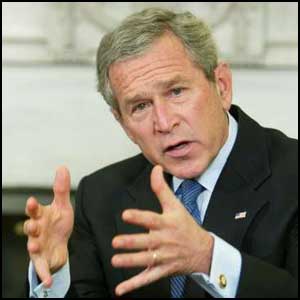
Leadership, handling of the U.S. economy, foreign policy accomplishments, integrity . . . A university study examines the White House’s past 43 tenants.
No, despite the poor opinion held by part of the United States and the world about his two presidential terms, George W. Bush is not the worst American president of all time. At least, such is the conclusion of a study directed by Siena College in Albany (in the state of New York), according to American political experts.
He actually comes out pretty well in the category of party leadership (23rd), luck (19th), and willingness to take risks (18th) ⎯ three of the numerous criteria by which the past 43 occupants of the White House have been measured. But he comes almost dead last (42nd) in foreign policy accomplishments, handling of the U.S. economy and the ability to compromise and communicate, as well as in intelligence.
Result: George W. Bush, who is refining the final draft of his memoirs, makes it into the Top 5 worst presidents of the United States, in 39th place, though he had managed to snag 23rd place in the preceding study, conducted in 2002.
His successor, Barack Obama, fared better, placing 15th behind Woodrow Wilson, John F. Kennedy, and Bill Clinton, and just ahead of Lyndon Johnson. What were the best performances of greenhorn Obama? Imagination (6th) and communication ability (7th) — the experts certainly judged more soberly than did most devotees of Obamania.
43 Presidents or 44?
Why are 43 presidents recorded when Barack Obama is the 44th President of the United States? Because Grover Cleveland got counted twice! At the end of the 19th century, he carried two presidential elections, but not successively. He became, therefore, the 22nd and the 24th president. Siena College only counted him once in its ranking. There you have it.
Both the top and the bottom of the list are occupied by the usual suspects. In the Top 5 are the Mount Rushmore figures: Theodore Roosevelt, Abraham Lincoln, George Washington and Thomas Jefferson. Franklin Roosevelt tops them all, number one since these Siena College studies began in 1982. The bottom three do not change much either: Andrew Johnson, dead last this year, James Buchanan and Warren Harding regularly duke it out to see who will bring up the rear.
All have directed the country in different contexts. Some have led a nation torn by the War of Secession, or stunned by the Great Depression, and others have not had the time to prove their worth (William Harrison was only president for 31 days). Such a ranking, therefore, is not of absolute relevance. But in the United States, this tradition of presidential rankings remains firmly rooted.

Leave a Reply
You must be logged in to post a comment.